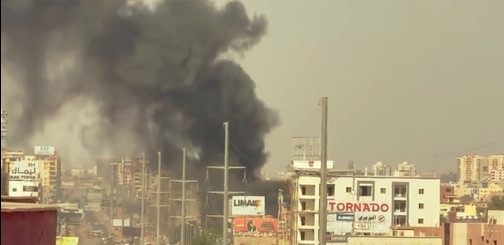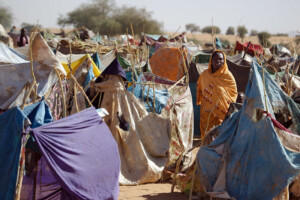Escalated fighting in greater Khartoum persists, prices of fuel and food soar in Sudan

Black smoke rises over Khartoum on November 28 last year (File photo: Elmigdad Hasan)
Four people were killed in fierce fighting between the Sudanese army and the Rapid Support Forces (RSF) in Khartoum North on Sunday. Yesterday, the warring parties continued their battles in several parts of greater Khartoum. The escalated fighting since last week has led to an increase in the already soaring prices of basic commodities in the country, causing people who fled Khartoum last year to return.
Warplanes bombed RSF targets in Sharg El Nil (East Nile) in Khartoum North yesterday morning.
The RSF and the Sudan Armed Forces (SAF) exchanged heavy artillery shelling in areas where the army is still stationed, the SAF General Command in central Khartoum and the Signal Corps in Khartoum North (Khartoum Bahri).
Fighting was also reported from El Ma’amoura, El Ta’if, and Arkaweet in Khartoum, and old Omdurman.
The resistance committees of El Abbasiya in Omdurman accused the RSF of “indiscriminate shelling” the neighbourhoods of El Abbasiya, El Morada, and the area north of the Grand Omdurman Market.
On Sunday, four people were killed, and others injured when missiles hit the building next to a ‘volunteer kitchen’ in Shambat, Khartoum North.
One of the gas depots of the El Jeili oil refinery in Khartoum North was reportedly bombed on Sunday morning. RSF members posted videos of a large fire at the depots – which has not been confirmed.
Artillery shelling continued from the Wadi Sedna military base in northern Omdurman towards RSF targets in Omdurman. SAF supporters posted videos on social media, showing the army’s control of areas north of the El Hilal Stadium in Omdurman, and the governor of Khartoum visiting the site on Saturday.
In Khartoum, people reported “heavy explosions” in the vicinity of the El shajara military compound in southwest Khartoum. Clouds of smoke rose from the southern neighbourhoods of El Imtidad and Jabra towards El Medina El Riyadiya (Sports City).
The resistance committees of Wad Madani, capital of El Gezira, which came under control of the RSF on December 18, reported renewed aerial bombardment by the Sudanese Air Force on several areas in the city on Sunday.
Worsening living conditions
The humanitarian situation in the neighbourhoods of Khartoum state has further worsened after SAF-RSF battles flared again last week.
The majority of the neighbourhoods in Khartoum, Omdurman, and Khartoum North suffer from a scarcity of food and the interruption of drinking water and electricity provision. Most of the hospitals and clinics, both governmental and private, stopped operating. Those still open, are controlled by the RSF, while the El Nau Hospital in El Sawra, Karari locality, is under control of the army.
The hampered fuel provision is paralysing traffic in and from the three cities. A gallon (four litres) of petrol is now sold for SDG40,000* while a gallon of diesel costs SDG20,000.
The prices of bus ticket to Wad Madani, capital of El Gezira, or to Kosti in White Nile state doubled last week as a result of the increased scarcity of fuel, and now cost SDG30,000.
As for food, the price of a sack of 50 kilogramme sugar rose from SDG80,000 to SDG120,000, while a kilogramme of lamb meat rose from SDG13,000 to SDG15,000.
The prices of vegetables and fruits increased less, a crop merchant told Radio Dabanga from Omdurman. “The price of potatoes, tomatoes, and eggplant stabilised at SDG2,000, the price of onions even fell, from SDG120,000 to SDG75,000.”
He attributed the price increases to the high costs of deportation.
Returning to Khartoum
The situation in the so-called safe states in the country is far from good as well, with extremely high rents asked for a few rooms or a basic apartment.
A source told Radio Dabanga about “reverse movement of people from the states to Khartoum”, citing a rise in the prices of sugar and flour in the states.
In River Nile state, measures have ben taken to halt the increase in bread prices. The Economic Committee ordered regular inspection of bakeries, while the state’s Finance Minister announced that no new increases will be allowed.
* The rate of the US Dollar on the parallel market these days amounts to about SDG1,500. The Faisal Islamic Bank sells US Dollars for SDG1,078 today.











 and then
and then